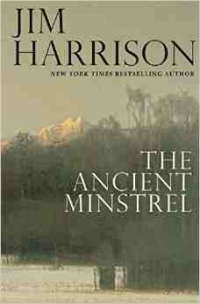
Published by Grove Press on March 1, 2016
One of the characters in The Ancient Minstrel mentions that editors want big, sprawling stories that smack readers in the face. Jim Harrison doesn’t do a lot of smacking. He writes meandering stories that observe foibles and failures, that pry into the ordinary, that tell stories within stories and make readers pause and grin and perhaps indulge in a knowing chuckle. His characters enjoy sex and food and rivers but they are usually uncertain about the other things in life, if any, that might give them pleasure. The three novellas collected here are emblematic of Harrison’s work.
Typical of Jim Harrison’s recent fiction, “The Ancient Minstrel” is about an aging man who drinks too much, sleeps around (a habit that is impaired by aging and drinking too much), lies habitually, and copes with “imagined monsters” as well as all of life’s “deep injustices” (such as the death of a pet). The story’s protagonist, a 70-year-old writer/poet, is melancholy but his thoughts of suicide have always been interrupted by hunger before he could act upon them. The writer is semi-separated from his surprisingly tolerant wife. Whether that tolerance will extend to harboring the pregnant pig he impulsively purchases for their Montana ranch is one of many situations that showcases Harrison’s wry humor.
The point of “The Ancient Minstrel” (I think) is that there are always reasons to continue living, unexpected moments of pure joy that, even if fleeting, make it all worthwhile. A brief epilog, written in the first person, discusses the craft of writing in very personal terms.
The second entry, “Eggs,” tells the story of Catherine, whose grandparents owned the Montana farm where her mother (a London transplant) desperately wanted to live. The story explores different periods of Catherine’s life: London during the Blitz, Palm Beach after the war, wrong men everywhere, including an incarcerated brother. Through it all, her affinity for chickens never abates. The title refers not just to chickens but to Catherine’s own eggs and the difficulty of finding someone worthwhile to fertilize them. The point of the story might be that chickens are better for your mental health than parents or partners. But the more meaningful theme is that the past is always part of the present. Life is “a constant whirl in which people often behave horribly,” yet “the past lives on in all of us” and we need to find a way to make peace with it.
“The Case of the Howling Buddhas” features Sunderson, a retired cop and current private investigator who is familiar to Harrison fans. The story, in fact, is almost a continuation of the last Sunderson novel, with frequent references to past events. Sunderson’s behavior is rather scandalous (it usually involves females who are barely, or not yet, old enough to vote), which makes him either endearing or disgusting to readers (opinions are sharply divided, judging from Amazon reviews). This story comes the closest of the three to having a plot (Sunderson is hired to track down a wealthy man’s daughter who has run off with a Zen teacher) but its focus is on Sunderson’s lust for a girl who is a half century younger than Sunderson. The ending comes as a shock.
I like Jim Harrison for many reasons. One is that he makes a point of writing about characters who go out of their way to play with dogs. Another is his ability to capture all of the anxieties, regrets, vanities, and emotional frailties of aging men. Another is that his characters are, like all of us, “trying to figure out life,” although the theories they derive are funnier than most of us manage to conjure. Another is his honest depiction of rural life, in counterpoint to the “literary tradition” that buries rural America “in honeysuckle and lilacs, hardworking and noble yokels.” Another is his recognition that big events can have small consequences that compound over a lifetime. Another is the amount of wisdom he manages to impart in throwaway sentences as the story meanders along. Another is the deep love of nature that his characters express. And another is the way he manages to give a folksy quality to literary prose (or a literary quality to folksy prose). All of that is present in these three novellas, which I recommend as must reading to Jim Harrison fans.
RECOMMENDED